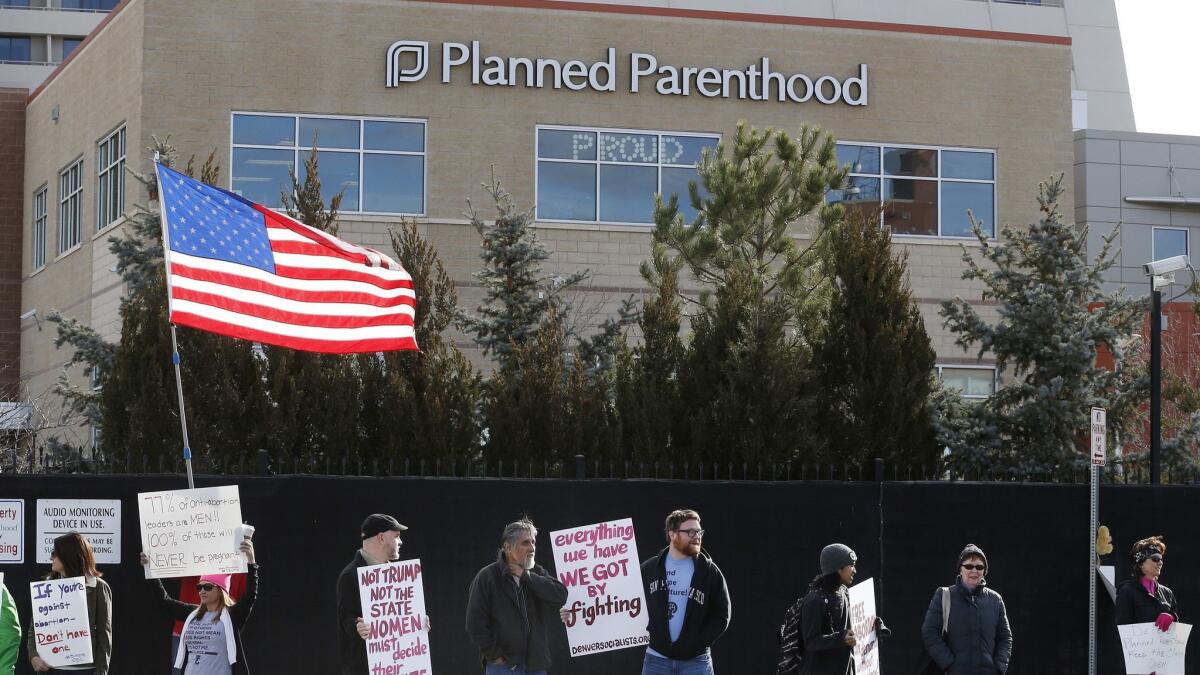Editorial: Undermining an effective birth control funding program to promote abstinence is the height of stupidity

- Share via
For nearly half a century, the Title X Family Planning Program has been a crucial source of federal dollars for family planning and related healthcare services for low-income Americans. Enacted with bipartisan support in 1970, the program’s mandate to provide “a broad range of acceptable and effective family planning methods and services” has helped millions of lower-income women each year obtain contraceptives and take control of their destinies, at least in terms of deciding if and when to have children.
In 2015, according to a federal government report, more than 4 million patients (the vast majority of them women) got healthcare through Title X funds, including screening for breast and cervical cancers and sexually transmitted diseases. Researchers at the Guttmacher Institute, which supports reproductive rights, estimates that Title X care helped women avoid more than 800,000 unintended pregnancies that year.
The program has survived numerous changes of administrations over the decades, carrying out its mission relatively unscathed by politics. But the biggest provider of Title X services is also the GOP’s current favorite healthcare punching bag: Planned Parenthood, which operates 13% of the clinics funded under the program and cares for about 40% of the patients. And now the Trump administration is steering the program itself in the wrong direction.
Recently released guidelines for providers applying for funds signaled such a disturbing shift away from the program’s previous guidelines and statutory mandate that it triggered two lawsuits. The complaints — filed on behalf of three state Planned Parenthood groups and the National Family Planning & Reproductive Health Assn. — argue that the Department of Health and Human Services is unlawfully directing applicants to emphasize natural family planning or abstinence as birth control. They’ve asked for an injunction that would stop the new guidelines from being implemented, and the courts should grant it.
No one disputes that abstinence is guaranteed to prevent pregnancy. What’s not guaranteed is that people will actually abstain.
The problem isn’t that the new guidelines instruct service providers to offer natural family planning (the calendar, or “rhythm,” method of birth control) and abstinence as possible methods of birth control. The Title X statute requires as much, and Planned Parenthood officials say they have always offered these options in their clinics.
But the previous guidelines (from 2016) also emphasized that providers should offer the full range of FDA-approved contraceptives, or justify why any of the methods were not offered. The new guidelines don’t even mention the word “contraceptive.” Instead, they instruct providers to put a “meaningful emphasis” on counseling that extols the benefits of avoiding the risks of sex outside marriage, both for adolescents and adults. And for adolescents, in particular, providers should communicate the benefits of delaying sex, according to the guidelines.
The Trump administration is clearly trying to take a program that has successfully provided legions of clients medically effective birth control and counseling and use it to promote its philosophy that abstinence is the best policy, especially for adolescents. It’s an approach championed by Vice President Mike Pence and the Trump appointee overseeing Title X grants, who previously ran an organization that promoted abstinence-only sex education. But not only does the new policy arguably violate Title X by emphasizing abstinence over other forms of family planning and encouraging single women not to have sex, it does so at the expense of other proven methods of birth control.
No one disputes that abstinence is guaranteed to prevent pregnancy. What’s not guaranteed is that people will actually abstain. And if they have no other birth control information, they’re ill equipped to protect themselves. Study after study has shown that encouraging young people to abstain from sex without giving them information about other forms of birth control only means that when they do have sex, they’re more likely to have unintended pregnancies and contract sexually transmitted diseases.
In a 2017 review of studies and policies for the Journal of Adolescent Health, researchers found that abstinence-only-until-marriage programs “have little demonstrated efficacy in helping adolescents to delay intercourse.” And while those programs were theoretically protective against pregnancy and sexually transmitted infections, the review found, “in actual practice, [such] programs often fail to prevent these outcomes.”
Just as troubling — and even more dramatic — is the administration’s decision to remake the successful federal Teen Pregnancy Prevention Program to emphasize abstinence-only counseling. As HHS concedes, teen pregnancies nationwide have dropped steadily, hitting a record low in 2016. Where they remain high is among teens of color and in low-income households. But those statistics don’t justify an abstinence-only approach. What poor and underserved populations need is better access to healthcare centers offering a wide range of birth control methods and education programs that have already proven successful.
These shifts are wrong-headed and counterproductive. Federal officials need to back off from them immediately.
Follow the Opinion section on Twitter @latimesopinion or Facebook
More to Read
A cure for the common opinion
Get thought-provoking perspectives with our weekly newsletter.
You may occasionally receive promotional content from the Los Angeles Times.










